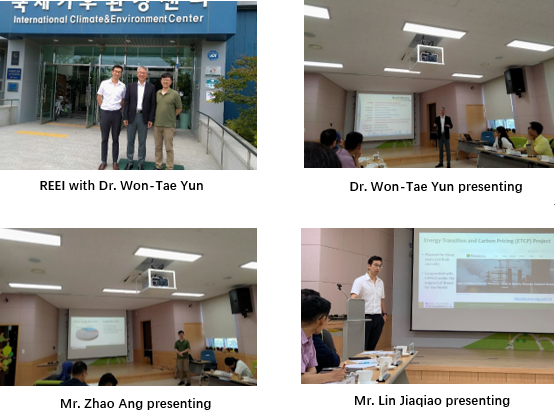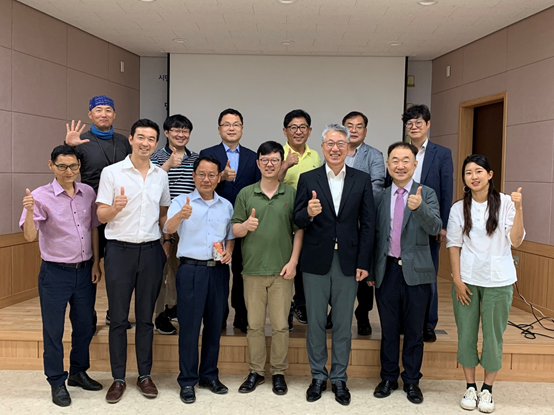

The project team (Mr. Zhao Ang, director of REEI, and Mr. Lin Jiaqiao, deputy director of REEI) traveled to South Korea from 1st July to 5th July to visit several Korean environmental NGOs, think tanks and research institutions in Seoul, Gwangju and Busan, aimed to understand their work on energy and climate issues, and to introduce the Energy Transition and Carbon Pricing (ETCP) Project which is cooperated by REEI and CANGO.
During the field trip, they participated in a seminar jointly organized by the International Climate and Environment Center (ICEC) and the Korea Federation for Environmental Movements (KFEM) on the morning of 4th July, 2019 at the ICEC office building. Participants are mainly from local environmental NGOs, including KFEM Gwangju, Korea Green Party, Gwangju Eco-mobility, Gwangju Chonnam Buddhist Environmental Solidarity, and Gwangju Council for Sustainable Development. The main purposes of the seminar are to introduce the working areas of REEI and ETCP Project and to listen to the work and research of environmental NGOs in Gwangju – the initial communication for future cooperation.
Participants:
Rock Environment and Energy Institute (REEI), International Climate and Environment Center (ICEC), Korea Federation for Environmental Movements (KFEM) Gwangju, Korea Environment Institute, Gwangju Chonnam Buddhist Environmental Solidarity, Gwangju Eco-mobility, and Gwangju Council for Sustainable Development.
ICEC has accumulated years of experience in urban planning, urban climate management, and climate simulation, aimed to develop future-oriented response to climate change that is tailored to the city’s needs, through studies on climate change and analysis on greenhouse gas (GHGs) emissions in the region. Additionally, ICEC is determined to lay the foundation for a carbon-neutral, green city by promoting green living and developing programs that engage citizens in climate action. Dr. Won-Tae Yun, new president of ICEC, first shared the development history and working areas of ICEC, and also introduced their two major projects, one on climate knowledge sharing, mainly the capacity building on urban climate change and environment; the other is about urban GHGs emissions management, mainly based on the Urban Carbon Management System (UCMS).
Mr. Zhao Ang presented the status quo of China’s energy and climate change policy and its future prospects, and he also showed the current status of Chinese CSOs’ engagement in energy and climate change issues. After that, Mr. Lin Jiaqiao introduced the ETCP Project to all participants, including project background, framework, visions, objectives, progress and cooperation. Finally, he made several suggestions on how to cooperate with the Korean environmental CSOs in the future.

Dr. Sang In Kang, chief researcher of Korea Environment Institute, gave a speech on the progress of Korea’s energy transition and carbon pricing. He pointed out that solar-integrated farming is one of the main choices for South Korea to complete its target of 20% renewables in 2030, as it can solve a series of problems such as limited land area and unfair subsidies. Regarding the possibility of successful solar-integrated farming, Dr. Kang said that he is still very optimistic. The current pilot projects have been completed and the implementation effect is good. The project team will continue to follow up on the progress of solar-integrated farming in South Korea.
The meeting not only has a fruitful exchange of policies and practices, but also the achievement of cooperation intensions. ICEC made specific proposals on the cooperation with the project team. First, they invited REEI to participate in two events organized by ICEC in October and November this year, and hoped that REEI could give a speech on energy-related issues. In addition, ICEC is considering allowing REEI to join in the Urban Environmental Management Network as an observer.

Group photo of Gwangju ICEC Seminar




